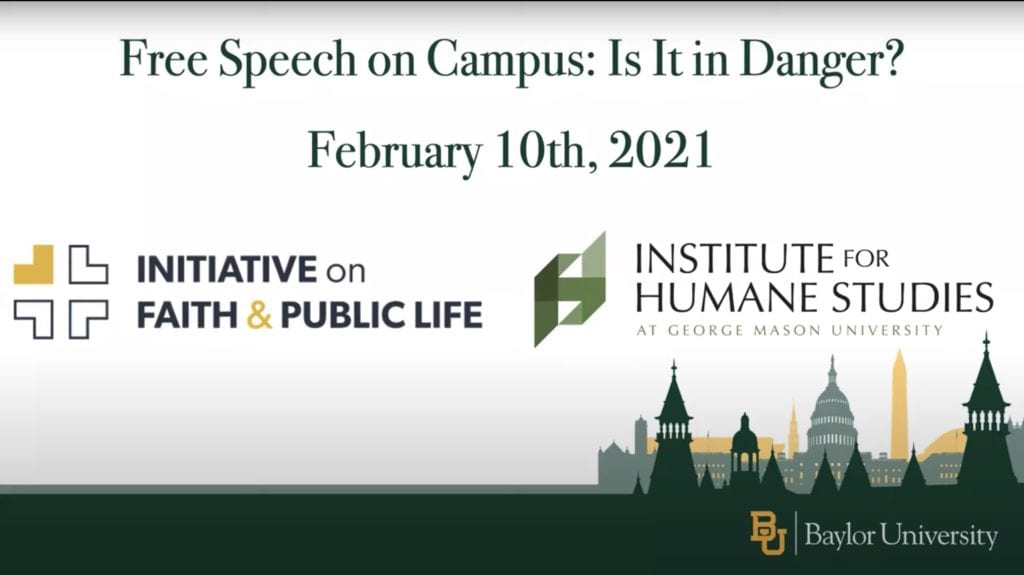Americans have agonized in recent years at the rise of an illiberal movement to socially and economically punish those deemed socially offensive. Societal concepts of blasphemy and taboo aren’t new. However, today those boundaries seem to be constantly shifting and dependent on subjective feelings and experiences with which one cannot argue. To address this problem Baylor University in Washington, D.C., in conjunction with the Initiative on Faith & Public Life and the Institute for Humane Studies, hosted a panel on protecting free speech.
Panelists included David French, senior editor of The Dispatch, Jonathan Rauch, contributing editor to The Atlantic, Kristina Arriaga, former Vice Chairwoman of the U.S. Commission on International Religious Freedom (USCIRF) and Thomas Chatterton Williams, a fellow at the American Enterprise Institute (AEI). It was moderated by Baylor’s Dr. David Corey.
Almost immediately the group agreed that belief in a “right not to be offended” is a major problem. Rauch believes that “most important I think is the emergence of the concept of emotional safety – that if you’re hurt by words this causes pain… suffering in your brain. The circuits that light up are similar… to circuits that light up if you’re subject to physical violence and that’s a form of abuse.”
Part of the reason it’s so difficult to argue against, or even talk about, the phenomena of extreme offendedness is that it’s often wrapped in an oppression narrative. This “lens of oppressor and oppressed… sets us in a relationship of moral inequality,” argues Corey. “I think free speech depends on a kind of civic equality where we both have the right to speak and share our view, but that oppression narrative undermines that equality.”
The specter of identity politics lies at the heart of the problem. Pluralistic liberal society struggles to address how to weigh the personal experience of one person with the rights of another. Phrases like “lived experience” and “speak my truth” have become common and try to convey the validity of emotional pain, especially as part of this oppressor-oppressed relationship.
Once the oppressor/oppressed categories are set, the idea of giving everyone not only legal protection but also social latitude to promote unpopular ideas is much less convincing. After all, if some people have unique access to an elevated type of truth, then why allow anyone to contradict?
AEI’s Williams described these “identity categories” as “opening the door for “identity epistemology, that only certain thoughts are available to certain identities and therefore only certain identities are able to speak about certain aspects of our shared reality. So, it means that we’re cutting off the world and the only acceptable answers are to listen and some people are never to speak on certain issues.”
What is to be done to fight for free speech? One answer is to lobby leaders at important institutions to declare that their institutional values include freedom of speech. Rauch, referring to the famous University of Chicago statement on freedom of speech, said that “consistent leadership from the top of the university that state’s the university’s values clearly makes just a huge difference all the way down the chain.”
The University of Chicago president states that “We believe universities have an important role as places where novel and even controversial ideas can be proposed, tested and debated. For this reason, the University does not limit the comments of faculty members, mandate apologies, or impose other disciplinary consequences for such comments,” and has been endorsed by 81 other universities.
In addition to bringing institutional power to bear, French advocates an everyday courageousness to speak our minds. Referencing Harry Potter’s moniker “The Boy Who Lived,” French said we need more people to face censorship and survive, as the fictional Harry survived the villainous Voldemort, to lead the fight for free speech by example; “The foremost way we can push back against the culture of censorship is just establishing a counterculture of courageous speech.”
Arriaga, who is Cuban-American, also protested the idea that minorities necessarily require some kind of ideological shielding from potentially offensive ideas more than anyone else; “We’re not wimpy people simply because we’re minorities and the idea of being insulted or offended yields to discourse and conversation.”
In closing, Rauch said that he believed socially and legally protected free speech is a deeply counter-intuitive, calling it “bonkers.” For this reason he expects every generation to struggle over how to maintain robust freedom of expression and debate. “We’re just gonna have to get up every morning for the rest of our lives and start from scratch making this case all over again, and the same will be true of our children and their children and their children.”






Comment by Gary Bebop on February 17, 2021 at 11:57 am
Terrific summary article! Please keep talking to us in free speech terms. The truth sets us free.